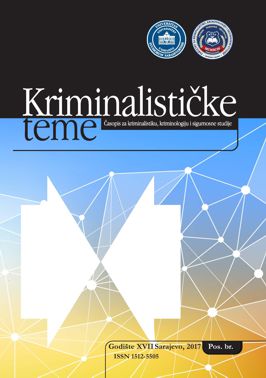RADNA EKSPLOATACIJA DJECE U BOSNI I HERCEGOVINI KAO OBLIK TRGOVINE LJUDIMA
CHILD LABOR EXPLOITATION IN BOSNIA AND HERZEGOVINA AS A FORM OF HUMAN TRAFFICKING
Author(s): Delajda Kurić – HodžićSubject(s): Criminal Law, Human Rights and Humanitarian Law, Labor relations, Criminology, Socio-Economic Research
Published by: Fakultet za kriminalistiku, kriminologiju i sigurnosne studije Univerziteta u Sarajevu
Keywords: human trafficking; exploitation; child; child labor; slavery; begging;
Summary/Abstract: Reason for writing and research problem(s): This article refers to the phenomenon of trafficking for the purpose of labor exploitation, which has in Bosnia and Herzegovina been present for a long time, and includes traditional slavery, forced labor and debt bondage. The most common form of labor exploitation in Bosnia and Herzegovina are child beggars which the children of the Roma national minority are particularly exposed to. Human trafficking is a serious violation of human rights and seriously undermines the victim’s life long after the exploitation has stopped. This is the reason why this form of criminal activity deserves much more attention when it comes to the prevention and protection of the victims. Aims of the paper (scientific and/or social): The research of the phenomenon of labor exploitation as a form of human trafficking, with the accent on young naive beings, is made in order to investigate and explain the social circumstances that prevent the development of human capabilities and put a human being in the position of slavery and exploitation. The general hypothesis was that the post-war living conditions, marked by different processes of transition, are crucial to the emergence and growth of labor exploitation of children as a form of human trafficking in Bosnia and Herzegovina, and this represents a serious social problem. The greatest risk factor for children labor exploitation stems from the underprivileged position of poor families, mainly caused by the war consequences. Children from these families are withdrawn from compulsory education and included in labor, which is even detrimental to their physical and psychological health, in order to create additional family income. Methodology/ Design: In assessing the situation and the real picture in Bosnia and Herzegovina related to the human trafficking, it was necessary to combine qualitative and quantitative methods of data collection.
Journal: Kriminalističke teme – Časopis za kriminalistiku, kriminologiju i sigurnosne studije
- Issue Year: XVII/2017
- Issue No: 5
- Page Range: 336-350
- Page Count: 15
- Language: Bosnian, Croatian, Serbian

